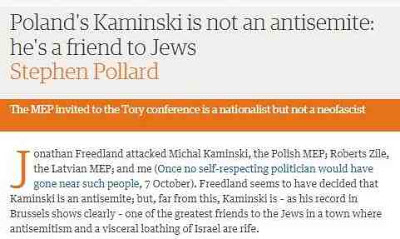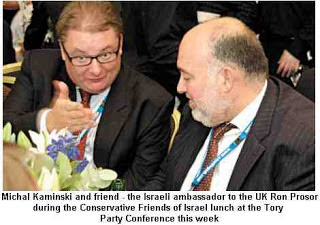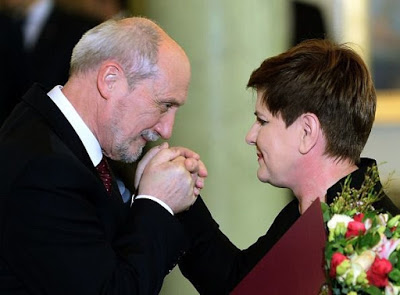Kaminski has now deserted Law & Justice for the right-wing Civic Platform
party, the differences between the two parties are marginal. Both oppose abortion and the right of women
to control their own bodies, both are homophobic and anti-gay rights, both oppose same
sex marriages, euthenasia and the decriminalisation of soft drugs. Both are free-market parties that support privatisation and liberal economics and of course both are virulently nationalist.
(see ) Kaminski was formerly a member of the fascist
National Revival of Poland Party.
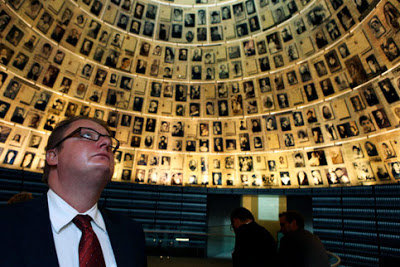 |
| Kaminski paying the ritual visit to Yad Vashem – an obligatory stop for racist visitors to Israel |
also the Zionists’ favourite anti-Semite, being a guest of honour in Israel at
the Global Counter-Terrorism Conference in Herzliya, Israel, September 2009. He also paid his respects to the dead of the holocaust
at the Yad Vashem propaganda museum, following in the wake of former Nazi John
Vorster and others.
Chronicle Stephen Pollard, “Far from being an anti-Semite, Mr Kaminski
is about as pro-Israeli an MEP as exists.”
‘Poland’s Kaminski is not
an antisemite: he’s a friend to Jews’. Indeed Kaminski is
‘one of the greatest friends to the Jews in a town [Brussels] where antisemitism and a visceral loathing of Israel are rife.’
member of the virulently racist Lubavitch sect, of Mill
Hill synagogue, invited Kaminski to his synagogue explaining that: “We are intending to host Michal Kaminski at an evening open to the
entire community once his itinerary is confirmed. It is hoped to hold this
event in liaison with Conservative Friends of Israel and I personally hope to
host him in a private capacity on a Friday night.’
“I decided to extend the invitation
precisely because of the ambiguity surrounding him. Mr Kaminski is known to
have a colourful past but is presently a strong supporter of Israel and is
leading a lobby against the anti-shechitah parties.” JC 3.11.10.
A ‘colourful past’ is certainly one way of describing being a member of
an openly anti-Semitic and fascist organisation, wearing fascist insignia and
being a homophobe (among other sins).
The following article in the liberal Jewish magazine Forward describes the anti-Semitic tendencies of Poland’s new Law
& Justice Party. It describes how in
Wroclaw, a demonstration against Muslim refugees ended up burning an effigy of
a Hasidic Jew, demonstrating if any proof were needed, that racism against
Muslims will inevitably cross over into anti-Jewish racism. Of course Israel has not criticised Poland’s
new government. Why should it? They are both Islamaphobic and racist and in
any case, anti-Semitism in Poland can only result in emigration to Israel,
which is something that Netanyahu always welcomes.
Tony Greenstein
Poland Turns Hard to Right — and Jews Wind Up in Crosshairs
some 50,000 people turned out in Warsaw recently to protest a plan by Poland’s
ruling party to pack the nation’s constitutional court, the hard right-wing
political faction responded quickly with a counter-demonstration of its own.
Its counter-protest featured, among other things, a placard that mocked those
claiming to defend democracy as “the committee to defend Jewish-Communist wealth.”
around the same time in Wroclaw, Poland’s fourth largest city, crowds at a
parallel demonstration to support the recently elected Law and Justice party
shouted, “Wroclaw is being de-Polanized as the Jews are buying up homes in the
city.”
another Wroclaw demonstration, held November 18 to protest a European Union
plan that would see Poland admit some 7,000 Syrian refugees, demonstrators
denounced the proposed immigrants as Islamists — and to somehow add to this
point, they set fire to a previously prepared effigy of a Hasidic Jew holding
the E.U. flag.
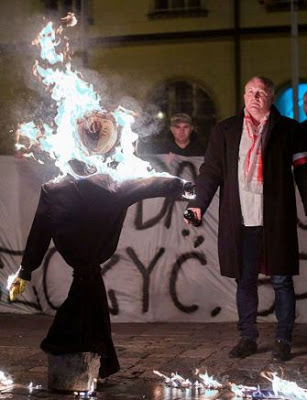 |
| Image: Reuters: Rage and a Non Sequitur? To protest against the immigration of Muslims and Syrian refugees, demonstrators in Wroclaw on November 18 burn an Orthodox Jew in effigy. |
Honor and Fatherland,” the crowd then chanted.
the October 25 elections that gave the strongly nationalist Law and Justice
Party an absolute majority in parliament, Poland has been a nation in crisis.
Like several other countries in Europe, the right-wing party’s rise back to
power after eight years in opposition was fuelled in part by anti-immigrant
furor, but also anger with the corruption of the government led by the incumbent
Civic Platform party. A backlash from rural Poles who feel left behind by the
country’s free-market reforms also played a big role. But critics charge that
Law and Justice is now using its absolute majority to implement anti-democratic
measures they denounce as “Putinist.”
amid all this, somehow, Jews have become a focus of ire among the party’s
defenders in the country whose huge Jewish population was decimated in the Nazi
Holocaust.
government harbors anti-Judaic sentiment which can easily become
anti-Semitism,” said the Rev. John Pawlikowski, professor of social ethics and
director of the Catholic-Jewish studies program at the Catholic Theological
Union, in Chicago.
other things, Law and Justice, known also by its Polish acronym, PiS, has
failed to denounce the effigy burning in Wroclaw. The party also has appointed
a defense minister who’s made anti-Semitic comments and has, via its culture
minister, Piotr Glinski, threatened to sue those it believes guilty of
“defamation against Poland.”
 |
| Image: Getty Images: See You in Court: Piotr Glinski (center), Poland’s minister of culture, has threatened to sue those he believes guilty of defaming his country. |
reminds me of the Communist takeover in the 1940s,” said Andrzej Zoll, a former
ombudsman for the constitutional court.
Harris, executive director of the American Jewish Committee, will soon visit
Warsaw to discuss the current situation with members of the new government. In
a telephone interview December 1, Harris told the Forward that any move away
from the full throttle of democracy that Poland has experienced since 1989
would be a very disturbing development.
cited AJC’s partnership with the Forum for Dialogue, the largest Polish
nongovernmental organization dealing with Polish-Jewish relations, which has
sponsored wide-ranging Polish-Jewish dialogue since 1996.
the forum continues to flourish, it will be a good and welcome sign,” Harris
said. “If this is not the case, everyone should be concerned, and it will be a
good litmus test.”
has been involved in Poland for 26 years. “We
will continue to remain involved with democratic forces there,” Harris
said.
see the new government’s drumbeat for Polish patriotism as cause for concern.
Engelking, director of the Polish Center for Holocaust Research at Warsaw
University, said she saw the form of national identity that PiS promotes as an
immature and simplistic model that constitutes a setback in Polish thinking
about the past.
historical research in recent years that deals with Polish crimes against Jews,
such as the 1941 massacre at Jedwabne and the murder of Jews elsewhere during
the German occupation, Engelking said she had hoped this research would give
the national discussion a deeper dimension that would force serious reflection
and help build a mature, complex national identity with an awareness not just
of Polish victimhood, but also of the crimes that Poles have committed against
Jews.
Zaryn, a PiS senator, disagrees. During a phone interview, he denied that
nationalists were rewriting history. “We
do not have to lie about our history, because it’s beautiful,” he said,
citing the valor of the Polish underground during the German occupation and the
loss of 3 million non-Jewish Polish lives under the Nazis, the same as the
number of Polish Jews. Zaryn also denied that there is deeply rooted
anti-Semitism in Poland.
prosecutors are considering a libel suit against Jan Gross, a Polish-born
Princeton University professor who recently wrote an opinion piece that
appeared in the German newspaper Die Welt, in which he claimed Poles killed
more Jews than they killed Germans during the German occupation. Gross is the
author of several books about Polish atrocities during World War II, including
“Neighbors: The Destruction of the Jewish Community in Jedwabne,” about the
1941 Polish massacre of Jews.
Polish American Congress, representing 9.5 million Polish Americans, doubts
that its countrymen murdered between 350 and 1,000 Jews, as generally estimated
by historians, in Jedwabne then. Frank Milewski, who is in charge of
documenting Holocaust information for the organization, said German bullet
casings were found in the barn where the Jews were burned to death. He said no
conclusions could be reached unless the bodies were exhumed. Frank Spula,
president of PAC, declined comment.
America, the Anti-Defamation League has expressed concerns about the government
not taking the opportunity to distance itself from expressions of anti-Semitism
and anti-Semitic acts. Foreign Minister Witold Waszczykowski responded to a
call by the ADL on the government to condemn the burning in effigy of a Hasidic
Jew at the November 18 Wroclaw protest by invoking “the Jewish lobby” and
calling for Poland to create its own lobby and narratives.
a November 17 conference in the Presidential Palace, called by President
Andrzej Duda, representatives from Polish museums and other cultural
institutions were told to galvanize Polish nationalism and to discard
narratives that brought Poland shame. Glinski told the gathering that building
a national identity was an important component in the PiS philosophy of
government.
there was no E.U. flag in the conference room. According to Marcin Zyla, an
editor at the Krakow-based liberal Catholic weekly Tygodnik Powszechny, the
absence of the E.U. flag was a symbolic rebuke to the secular Western European
community, which PiS sees as an existential threat to Catholic Poland.
not new, but this government is promoting PiS policy much more brazenly and
aggressively,” said Jan Grabowski, a Polish-born professor of history at
the University of Ottawa, in Canada.
xenophobia was very much evident during the November 18 demonstration in
Wroclaw, when demonstrators demonized Muslim refugees, warning that the
refugees were not welcome in Poland.
between that and the burning in effigy of the Hasidic-looking Jew holding an
E.U. flag, an action that Poland’s B’nai B’rith was quick to denounce?
folk culture as an eternal threat and a stranger,” said Piotr Pazinski,
editor in chief of Midrasz, a Jewish cultural magazine in Warsaw. “Holding an E.U. flag fortifies their racist
belief that Jews are orchestrating an E.U. plot to destroy white Catholic
Poland.”
far there has been no official government denunciation of the Wroclaw incident.
although he believes the Wroclaw demonstration consisted of a small group of
marginal people.
some Jews outside Poland with years of philanthropic investment in the country
are reluctant to stigmatize the new government. Sigmund Rolat, a Holocaust
survivor and funder of Warsaw’s new Museum of the History of Polish Jews, which
also receives government support, urged caution.
said. “We know about the threat to Jews
in Western Europe. By comparison, Poland is a safe haven for Jews. The mayor of
Wroclaw has ordered an investigation of the incident, and they know who set the
fire.”
has played a major role in the success of the annual Jewish Culture Festival in
Krakow and is an honorary citizen of his hometown, Czestochowa, for his
contributions to cultural life.
museum’s director, Dariusz Stola, a history professor, stressed that he does
not expect any pressure from the government to change the museum’s portrayal of
Polish behavior during World War II. “The
museum is a huge success,” Stola said.
efforts to reach philanthropist Tad Taube, whose foundation is a major
supporter of Jewish life in Poland, were unsuccessful.
the xenophobia and bigotry evident in the comments of government officials and
in public behavior at pro-government rallies has left many observers
pessimistic about the prospects for civil liberties and democratic values in
Poland.
an article in Foreign Affairs magazine, Mitchell Orenstein, a University of
Pennsylvania history professor of Slavic studies, wrote “goodbye to gay rights, in-vitro fertilization, abortion in the case of
potential harm to the mother, and other liberal policies.”
for the future of the 10,000 members of Poland’s organized Jewish community
(estimates of the total number of Jews in Poland beyond that core range up to 20,000),
Konstanty Gebert, a columnist and veteran of the underground fight against
communism, said: “If this democracy is
curtailed, Jewish life will shrivel. We are too few to hunker down and weather
the storm. Our future may well be on the line.”
